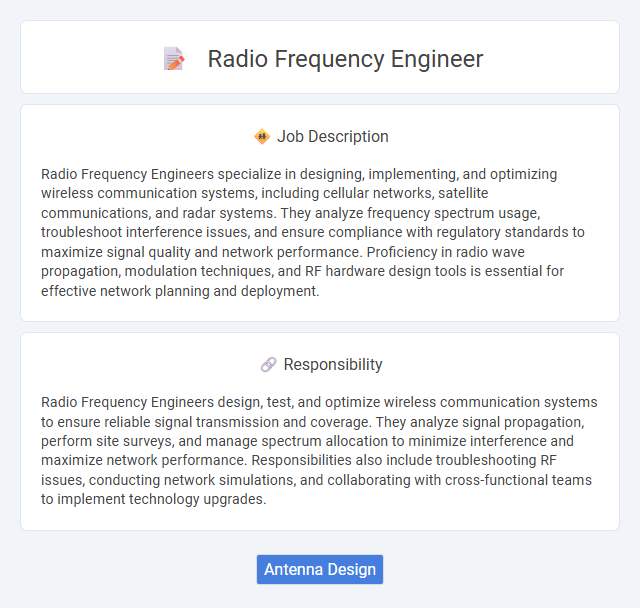
Radio Frequency Engineers specialize in designing, implementing, and optimizing wireless communication systems, including cellular networks, satellite communications, and radar systems. They analyze frequency spectrum usage, troubleshoot interference issues, and ensure compliance with regulatory standards to maximize signal quality and network performance. Proficiency in radio wave propagation, modulation techniques, and RF hardware design tools is essential for effective network planning and deployment.
Individuals with strong analytical skills and comfort working with complex technical systems are likely to find a role as a Radio Frequency Engineer suitable. Those who enjoy problem-solving, fieldwork, and adapting to rapidly evolving technologies could probably thrive in this position. Candidates less inclined towards continuous learning or working in high-pressure environments might face challenges fitting into this job role.
Qualification
A Radio Frequency Engineer typically holds a bachelor's degree in electrical engineering, telecommunications, or a related field, combined with proficiency in RF design, analysis, and optimization tools. Strong knowledge of wireless communication standards such as LTE, 5G, and GSM, along with experience in spectrum management and signal propagation, is essential. Certifications like Cisco CCNA, Ericsson Certified Network Engineer, or proficiency in MATLAB and RF simulation software enhance qualification and job performance.
Responsibility
Radio Frequency Engineers design, test, and optimize wireless communication systems to ensure reliable signal transmission and coverage. They analyze signal propagation, perform site surveys, and manage spectrum allocation to minimize interference and maximize network performance. Responsibilities also include troubleshooting RF issues, conducting network simulations, and collaborating with cross-functional teams to implement technology upgrades.
Benefit
The job of a Radio Frequency Engineer likely offers competitive salaries and opportunities for career advancement due to the increasing demand for wireless communication technologies. Benefits may include exposure to cutting-edge technology and participation in innovative projects related to 5G and IoT networks. Job stability and opportunities for remote work might also be probable advantages in this rapidly evolving field.
Challenge
Radio Frequency Engineer roles likely involve complex challenges requiring deep expertise in signal propagation and interference mitigation. They probably need to solve problems related to optimizing network performance under varying environmental conditions. Managing the integration of new technologies while ensuring regulatory compliance might frequently test their problem-solving and analytical skills.
Career Advancement
Radio Frequency Engineers specializing in wireless communication systems can accelerate career advancement by mastering 5G technology deployment and network optimization techniques. Gaining certifications such as Certified Wireless Network Expert (CWNE) and Cisco Certified Network Professional (CCNP) enhances expertise credibility and opens leadership roles. Experience in designing scalable RF solutions for IoT and smart cities projects significantly boosts prospects for senior engineer or managerial positions.
Key Terms
Antenna Design
Radio Frequency Engineers specializing in antenna design develop and optimize antennas for superior signal transmission and reception in wireless communication systems. Expertise in electromagnetic theory, simulation software like HFSS or CST Microwave Studio, and material science drives innovation in antenna efficiency, gain, and bandwidth. Mastery in tuning antenna parameters to minimize interference and maximize coverage is critical for enhancing network reliability in cellular, satellite, and RF applications.
 kuljobs.com
kuljobs.com